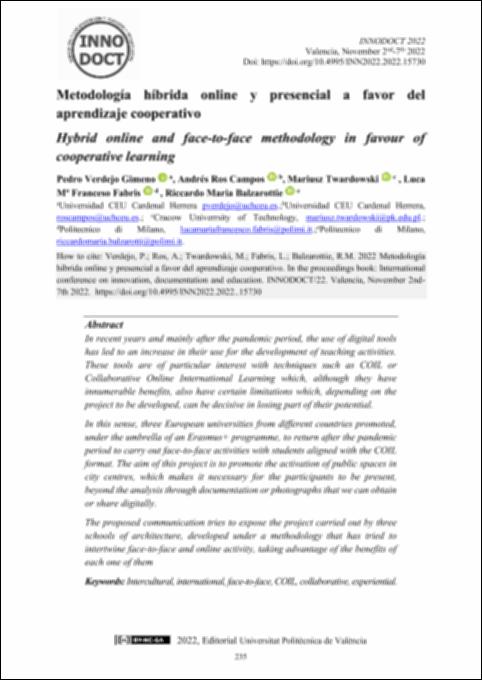Please use this identifier to cite or link to this item:
http://hdl.handle.net/10637/16247Metodología híbrida online y presencial a favor del aprendizaje cooperativo
| Title: | Metodología híbrida online y presencial a favor del aprendizaje cooperativo |
| Other Titles: | Hybrid online and face-to-face methodology in favour of cooperative learning |
| Authors : | Verdejo Gimeno, Pedro Ros Campos, Andrés Twardowski, Mariusz Fabris, Luca Maria Francesco Balzarotti, Riccardo Maria |
| Keywords: | Método pedagógico; Teaching method; Arquitectura; Architecture; Enseñanza a distancia; Distance learning; Alfabetización digital; Digital literacy |
| Publisher: | Universitat Politècnica de València |
| Citation: | Verdejo Gimeno, P., Ros Campos, A., Twardowski, M., Fabris, L.M.F y Balzarottie, R.M. (2022). Metodología híbrida online y presencial a favor del aprendizaje cooperativo. En INNODOCT 2022, International Conference on Innovation, Documentation and Teaching Technologies: Valencia, November 2, 2022 – November 7, 2022 (pp. 235-243). Valencia: Universitat Politècnica de València. https://doi.org/10.4995/INN2022.2022.15730 |
| Abstract: | Estos últimos años y principalmente tras el periodo pandémico, la extendida utilización de las herramientas digitales ha motivado un incremento de su uso para el desarrollo de actividades docentes. Estas herramientas tienen un especial interés con técnicas como los COIL o Collaborative Online International Learning que, aún con innumerables beneficios, también presentan ciertas limitaciones que, dependiendo de la actividad en la que se aplicar, pueden perder parte de su potencial.
En este sentido, tres universidades europeas de diferentes países, promovieron bajo el amparo de un programa Erasmus+, volver a realizar actividades presenciales con alumnos aprovechado también los beneficios del formato COIL en un sistema hibrido. Este proyecto tiene por objetivo promover la activación de los espacios públicos en los centros de las ciudades, por lo que se hace necesario la presencialidad de los participantes, aunque parte de las actividades previas al trabajo presencial se pretenden desarrollar en seminarios online.
La comunicación propuesta trata de exponer el proyecto realizado por tres escuelas de arquitectura, desarrollado bajo una metodología que ha tratado de entrelazar la actividad presencial y online, aprovechando las ventajas de cada una de ellas. In recent years and mainly after the pandemic period, the use of digital tools has led to an increase in their use for the development of teaching activities. These tools are of particular interest with techniques such as COIL or Collaborative Online International Learning which, although they have innumerable benefits, also have certain limitations which, depending on the project to be developed, can be decisive in losing part of their potential. In this sense, three European universities from different countries promoted, under the umbrella of an Erasmus+ programme, to return after the pandemic period to carry out face-to-face activities with students aligned with the COIL format. The aim of this project is to promote the activation of public spaces in city centres, which makes it necessary for the participants to be present, beyond the analysis through documentation or photographs that we can obtain or share digitally. The proposed communication tries to expose the project carried out by three schools of architecture, developed under a methodology that has tried to intertwine face-to-face and online activity, taking advantage of the benefits of each one of them |
| URI: | http://hdl.handle.net/10637/16247 |
| Rights : | http://creativecommons.org/licenses/by-nc-sa/4.0/deed.es Open Access |
| ISBN: | 9788413960364 |
| Issue Date: | Nov-2022 |
| Center : | Universidad Cardenal Herrera-CEU |
| Appears in Collections: | Dpto. Proyectos, Teoría y Técnica del Diseño y la Arquitectura |
Items in DSpace are protected by copyright, with all rights reserved, unless otherwise indicated.


